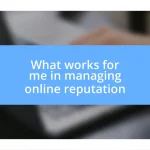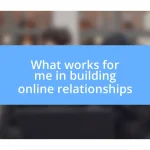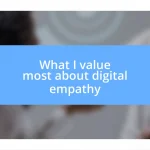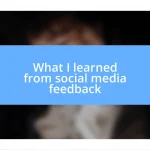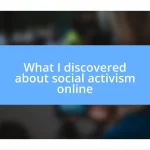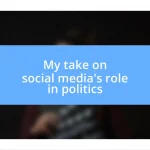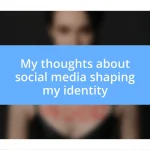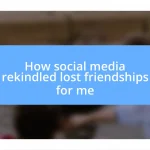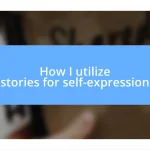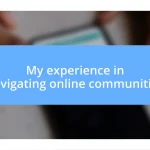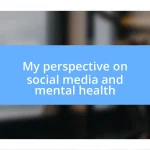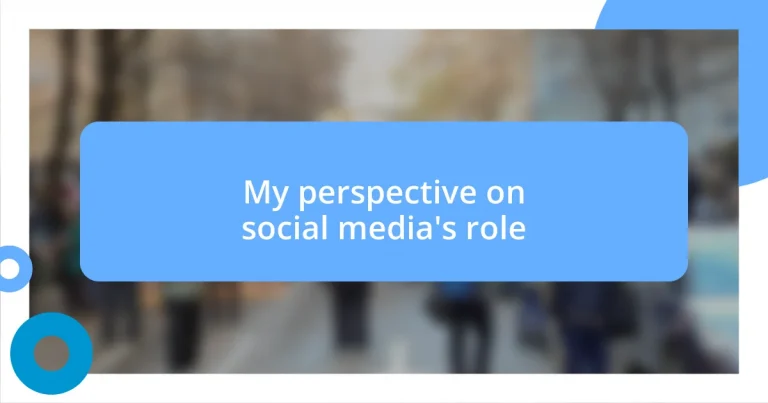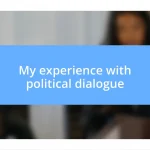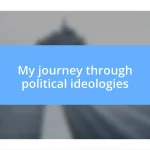Key takeaways:
- Social media significantly influences self-esteem and societal behavior, often leading to conformity at the expense of individuality.
- While it can foster positive connections and community support, social media also contributes to negative effects like cyberbullying, mental health issues, and misinformation.
- Future trends in social media may emphasize immersive experiences, mental health awareness, and a shift towards authenticity over perfection.
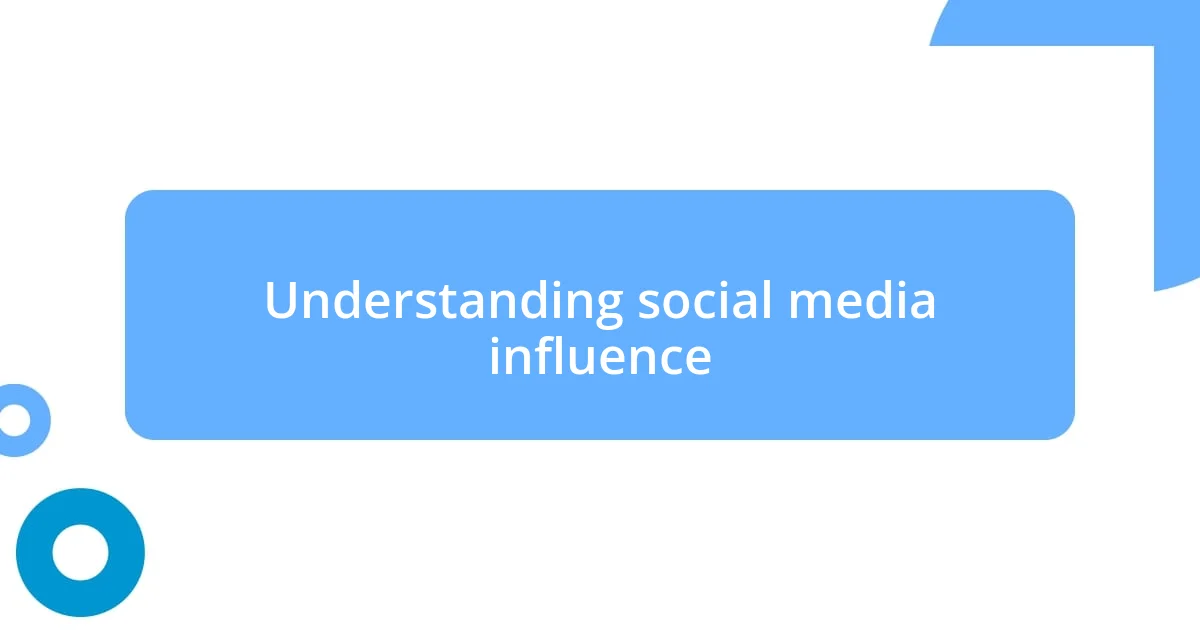
Understanding social media influence
Social media is a powerful tool that shapes our perceptions and interactions in ways we often overlook. I remember scrolling through my feed one day, feeling a mix of envy and inspiration as I saw friends posting their accomplishments. It made me wonder: how much do these curated snapshots of life influence our self-esteem and aspirations?
The way trends can spread like wildfire on platforms like TikTok or Instagram shows just how quickly social media can sway public opinion. I’ve switched my shopping habits based on viral videos, and I can’t help but think—do we really choose what we like, or are we simply following the herd? This conformity reflects our desire for connection, yet it can lead us to feel pressured to align with the latest trends, sometimes at the cost of our individuality.
Moreover, social media creates a unique echo chamber, amplifying certain voices while silencing others. I’ve felt the weight of this myself, often reflecting on how my own posts might resonate differently within various circles. It makes you ponder, doesn’t it? Are we truly expressing ourselves, or are we shaping our identities to fit the algorithms? This complex dynamic underscores the profound, and often contradictory, nature of social media’s influence in our lives.
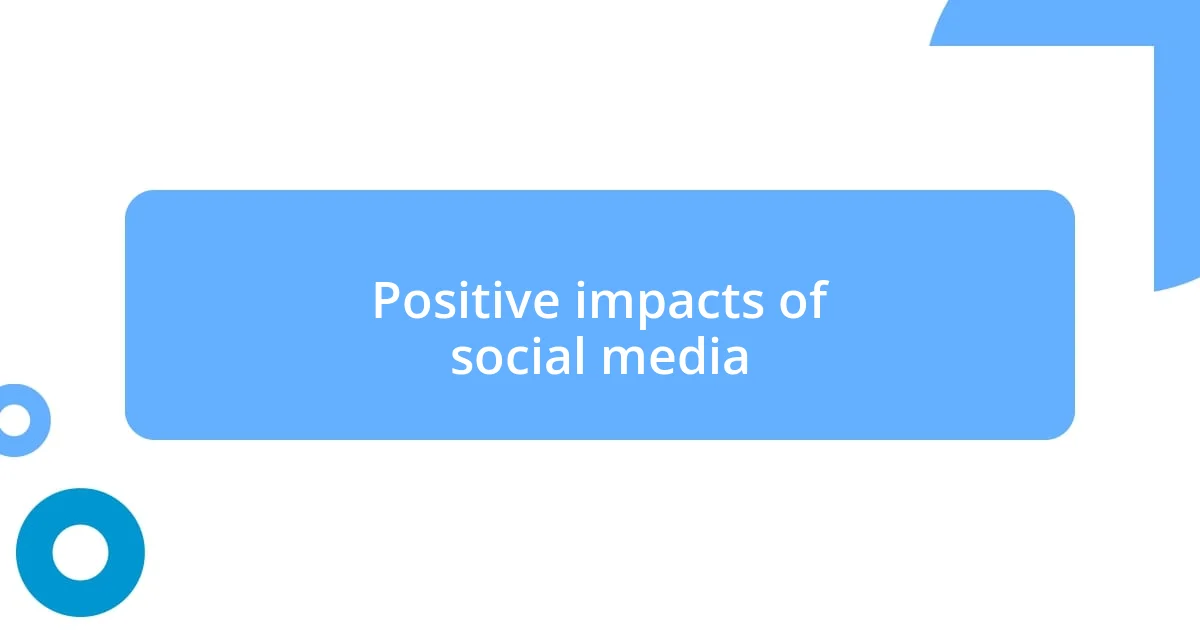
Positive impacts of social media
Social media, when used wisely, can tremendously enrich our lives and foster a sense of community. I remember joining an online group dedicated to a hobby I was passionate about. Suddenly, I was surrounded by like-minded individuals who shared not only tips and tricks but also their personal stories. This connection gave me a sense of belonging that I hadn’t found elsewhere. Watching people support each other through struggles made it clear to me how impactful these platforms can be.
Here are some of the positive impacts I’ve seen from social media:
- Connection and Community: It bridges gaps, connecting people across the globe over shared interests and experiences.
- Support Networks: I’ve seen how communities rally around individuals facing challenges—be it health issues or personal loss—providing emotional backing.
- Awareness and Activism: Social media amplifies voices for social change, sparking movements that can lead to substantial societal shifts.
- Inspiration and Learning: From DIY projects to cooking tutorials, I’ve discovered countless resources that have fueled my creativity and skills.
- Opportunities for Businesses: Many small businesses thrive through social media, reaching customers they might never have encountered otherwise.
These aspects, while often overlooked, highlight how social media can truly foster connectivity, support, and creativity in our lives.
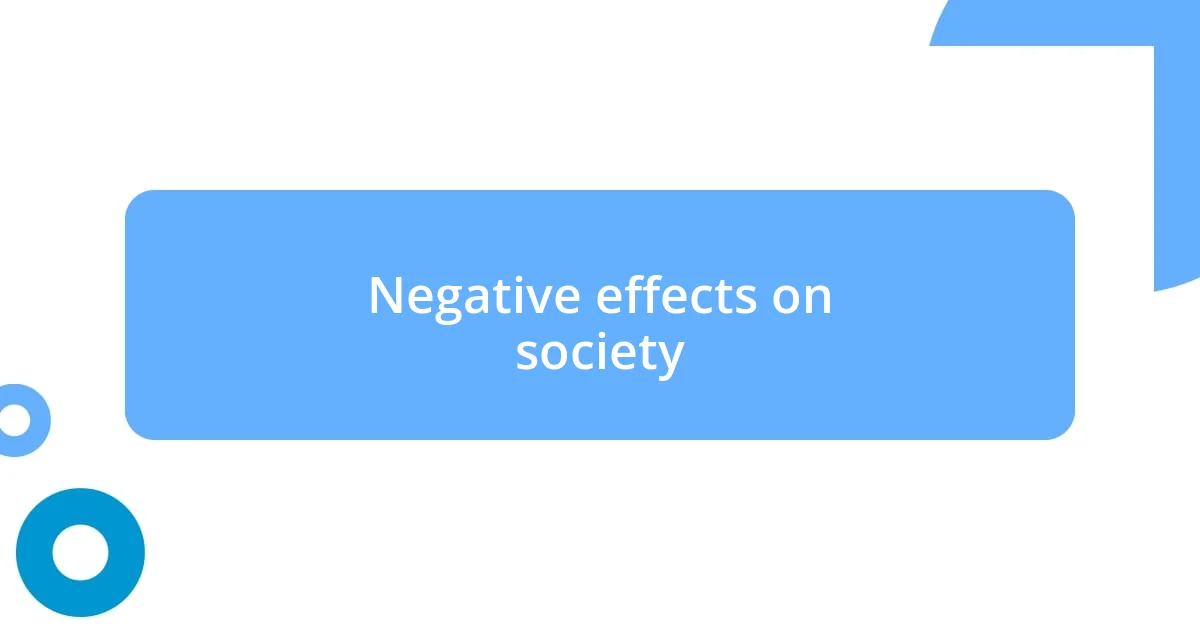
Negative effects on society
Social media’s negative effects on society often manifest in unexpected ways. One aspect that stands out to me is the rise of cyberbullying. I recall a friend sharing her painful experience online. She received hurtful comments about her appearance, which left her feeling isolated and unworthy. This incident opened my eyes to how easily words can wound, often leading to severe emotional distress for individuals.
Moreover, I’ve noticed a troubling impact on mental health, particularly among teenagers. Studies indicate that increased social media use is linked to anxiety and depression. I believe this partly stems from the constant comparison culture. I’ve found myself caught in it too, scrolling through polished images and feeling inadequate at times. It makes me wonder: have we traded genuine connections for superficial likes?
Finally, the spread of misinformation is another concerning byproduct of social media. It’s astonishing how quickly false narratives can gain traction and affect societal perspectives. I’ve seen friends share news articles that didn’t bother to fact-check, which raises the question—how does one discern truth in a sea of misinformation? It’s a challenge I grapple with and often engage my circle in discussions about the importance of source verification. In a world where information spreads like wildfire, critical thinking becomes vital.
| Negative Effect | Example |
|---|---|
| Cyberbullying | Hurtful comments leading to emotional distress |
| Mental Health Issues | Increased anxiety and depression among teens |
| Misinformation | False narratives affecting societal views |
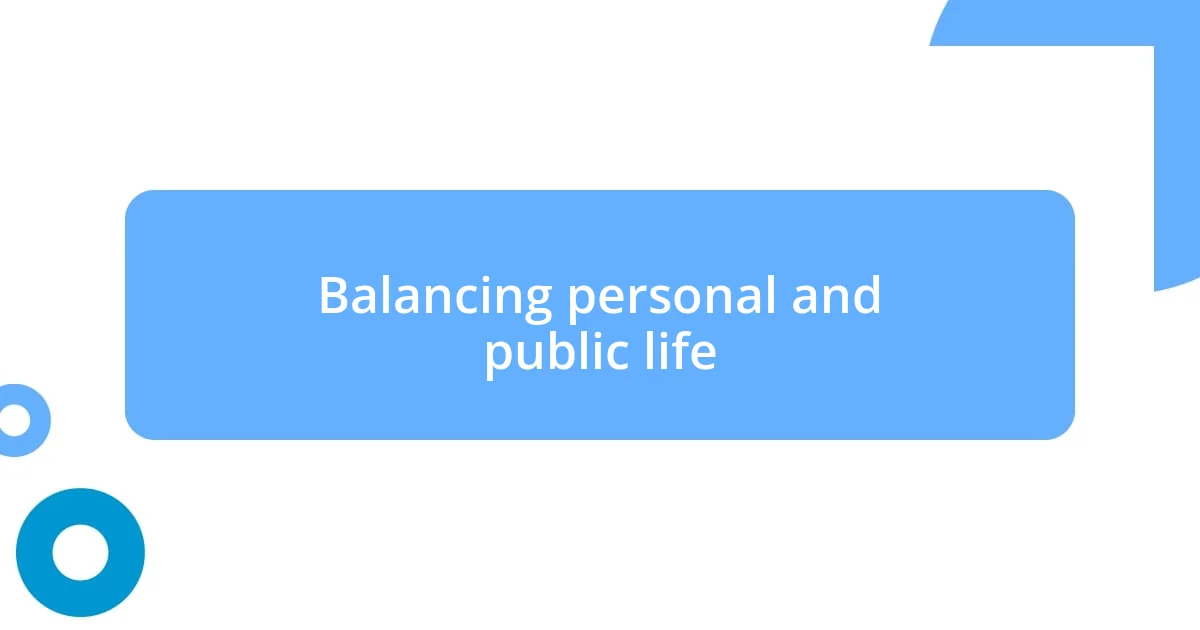
Balancing personal and public life
It’s a delicate dance, balancing personal and public life in the age of social media. I often find myself questioning what to share and what to keep private. Recently, I posted a picture of my family at a holiday gathering, feeling a mix of joy and hesitation. While I wanted to spread warmth, I also wondered if I was oversharing or inviting unwanted scrutiny.
I’ve learned the hard way that overexposure can lead to stress. A few months back, I shared too much about my work challenges, thinking it would foster connection. Instead, it attracted unsolicited advice and judgment from people who barely knew my situation. This experience taught me the importance of setting boundaries—recognizing that not every moment needs to be broadcasted to the world.
Navigating this balance often sparks a thought: Are we sacrificing authenticity for approval? I strive to share the highs and lows, but I’m mindful that my personal narrative shouldn’t become fodder for social media commentary. Ultimately, it’s about creating a space where I feel comfortable and secure while still engaging with others, striking that ever-elusive balance between sharing and safeguarding my private life.
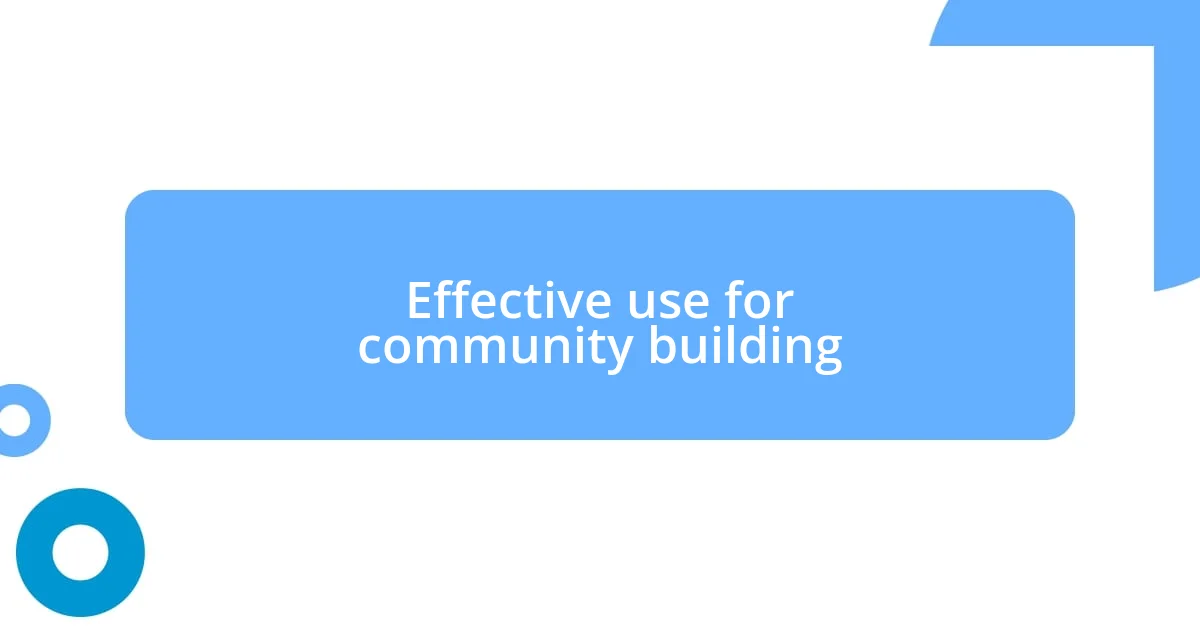
Effective use for community building
When I think about community building through social media, I can’t help but recall a local Facebook group I joined. It started as a simple space to share recommendations for local businesses, but quickly transformed into a lifeline during the pandemic. People offered help with grocery shopping and shared resources for mental health support. It made me realize how much connection can flourish online, even when physical interactions are limited. Doesn’t it feel empowering when you can support and uplift others, even from behind a screen?
One experience that stands out to me is when I participated in an Instagram live event organized by a local charity. The energy was electric as community members came together to raise awareness about a pressing issue in our neighborhood. I remember sharing my thoughts in real-time and connecting with others who were equally passionate. The collective enthusiasm felt palpable, reminding me how powerful it is to unite people around a common cause. Have you ever felt that surge of motivation when surrounded by like-minded individuals, even if it’s through a digital platform?
Effective community building boils down to fostering genuine connections and encouraging engagement. When I see others share their stories or ask for advice, it prompts a vibrant exchange of ideas and support. I often think about how one thoughtful comment can inspire someone to open up about their own struggles. It’s not just about numbers or followers; it’s about creating an authentic dialogue that resonates with everyone involved.
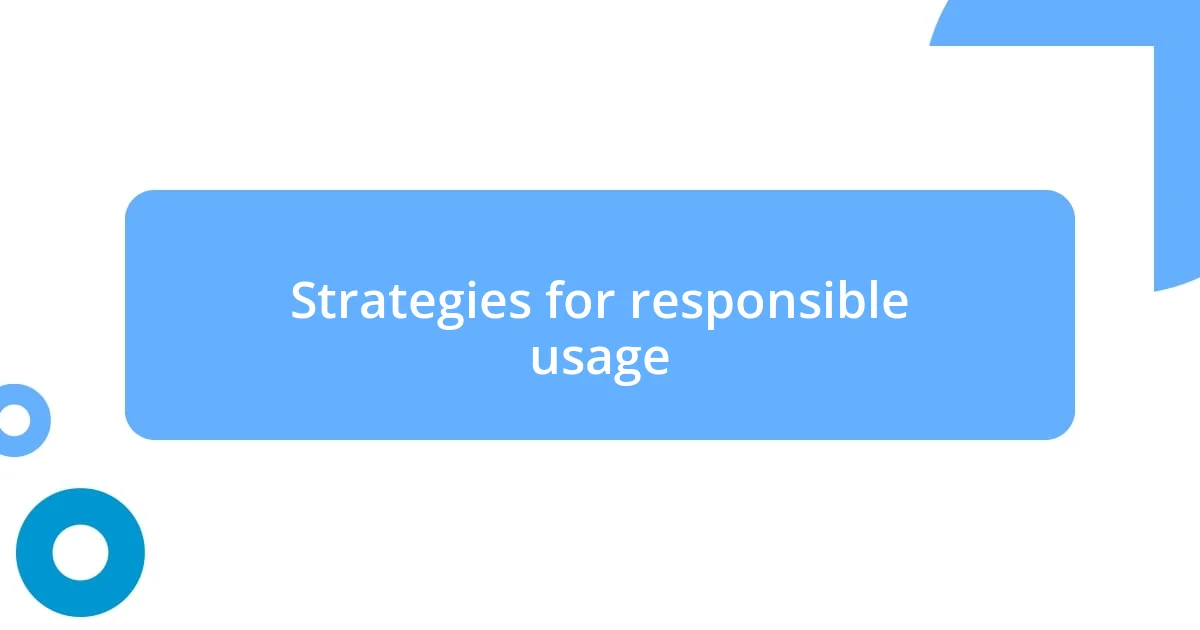
Strategies for responsible usage
Responsible usage of social media starts with self-awareness. I’ve found that taking a moment to reflect before posting helps me clarify my intentions. For instance, before sharing a controversial opinion, I ask myself: “Will this contribute positively to the conversation or just spark debate?” It’s an approach that helps me cultivate a more thoughtful social media presence.
Another strategy that resonates with me is curating my digital feed. I make it a point to follow accounts that inspire and educate rather than those that leave me feeling drained or inadequate. Recently, I unfollowed several influencers whose content felt repetitive and bought into the narrative of perfection. This shift not only improved my mental health but also encouraged me to actively engage with creators who uplift and challenge me. Have you considered cleaning up your feed to better reflect your values?
Setting time limits is a game changer too. I often set aside specific blocks of time for social media, which prevents mindless scrolling. There’s something refreshing about prioritizing real-life interactions over virtual distractions. When I’m intentional with my time online, it feels less like obligation and more like an authentic connection to my community. What strategies do you use to ensure your social media habits serve you well?
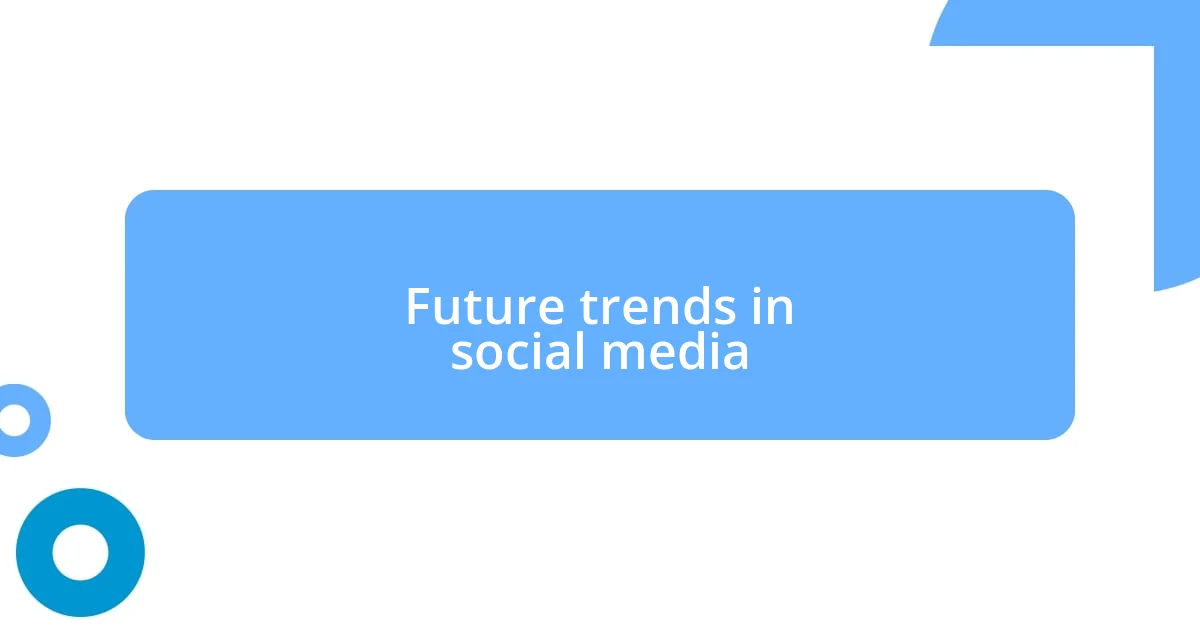
Future trends in social media
As I look ahead to the future of social media, I can’t help but feel excited about the rise of immersive experiences through platforms like augmented and virtual reality. Recently, I attended a virtual reality gathering that felt strikingly real; I could interact with avatars of friends who lived miles away, and it made me think about how these technologies will transform connections. Have you ever imagined attending an event without leaving your living room? The potential for deeper engagement and shared experiences is vast.
Another trend on the horizon is the increasing focus on mental health and well-being. I remember when I first noticed platforms integrating features that promote healthier habits—like reminders to take breaks or tools for mindfulness. It made me reflect on how I engage with social media. What if we all took breaks to evaluate how social media impacts us? This shift will not only create a healthier online environment but will also foster spaces that prioritize genuine interactions rather than just likes and shares.
Looking into the future, I foresee a greater emphasis on authenticity over perfection. During a recent scroll through TikTok, I stumbled upon a creator who shared their raw, unedited moments—flaws and all. This kind of content struck a chord with me because it resonated with the reality we all experience. Isn’t it refreshing when we see the real side of life? I genuinely believe that as more voices shift towards raw authenticity, social media will evolve into a platform that values honest connections over curated personas.
